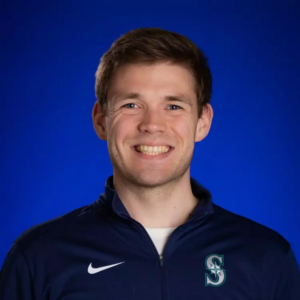
UChicago Data Science Alum Transforms Baseball Passion into Career with Seattle Mariners
July 3, 2025 — After graduating from the University of Chicago’s MS in Applied Data Science program in December 2024, Hank Snowdon packed his bags and headed west, joining the Seattle Mariners as a data scientist. With a lifelong love of baseball and a powerful new data science skill set, he’s now helping shape player decisions in one of Major League Baseball’s front offices.
From Upskilling to Sports Analytics
Hank enrolled in the MS-ADS program with a clear goal: level up fast.
“I saw it as an opportunity to really upskill quickly,” he explained. “I felt my analytical toolkit coming out of undergrad was somewhat limited, and I wanted something intensive and short that would have a big impact. The MS-ADS program checked all those boxes for me.”
While Hank always had an interest in sports analytics, it wasn’t until he joined the program that he fully leaned into the field.
“It’s a really hard industry to break into, so I had been hesitant to put all my eggs in that basket,” he said. “But when the capstone project with the White Sox popped up, I saw a chance to go for it, and that directly led to opportunities after graduation.”
A Capstone That Swung Big
The White Sox capstone project was ambitious: analyze hitting biomechanics using advanced data science techniques. “The White Sox team gave us a massive dataset and just said, ‘We’d love to have a fresh set of eyes look at this and try to come up with something we haven’t tried before,” Hank recalled. “That was an amazing opportunity, but also a challenge. We had to somewhat invent the project scope ourselves.”
Capstone projects are a required culminating experience in the MS in Applied Data Science program. Students work in teams over 2 quarters to solve real-world problems using real data from partner organizations. Projects are sourced through the program’s industry partnerships and alumni network, with sponsors ranging from Fortune 500 companies to startups and public sector organizations. Each project is guided by both a faculty advisor and a sponsor point-of-contact, and students are expected to deliver actionable insights, technical documentation, and a final presentation at the Capstone Showcase.
The complexity of the White Sox dataset made things even trickier. “Swing biomechanics data are highly collinear—everything in the body is moving together. So trying to figure out the causal effect of one body part, like the movement of a hitter’s elbow at contact, is really challenging.”
Still, the team’s innovative approach paid off. The project was awarded Best in Show at the Autumn 2024 Capstone Showcase, which helped Hank stand out in the competitive sports analytics field. “Seeing interest from other teams after graduation was really rewarding and pretty flattering.” he said.
From Project Work to Front Office Impact
Now in Seattle, Hank has found the ideal blend of his technical skills and personal passion.
“The Mariners play games nearly every day, and I get to feel like I’m part of that. Not on the field obviously, but definitely part of the team,” he said. “Talking about baseball is what I do as a hobby. So now getting to marry my technical skills with that hobby for work is a pretty good match.”
As a Data Scientist for the Mariners, Hank mostly builds models to better evaluate players.. “I’ve worked on our evaluation systems for hitters. Figuring out what a hitter’s true talent is and what’s noise is something that’s really important to us. I’ve also worked on defensive projects, helping fielders to get them best prepared for the pitch that’s coming.”
A surprising part of the job? Just how much you need to know about players across the league.“I thought I was a baseball fan coming in, but I quickly realized I knew almost nothing compared to people who do this for work,” he said. “A huge part of the job is knowing the player pool: who we’re up against, who we might acquire, what skills they bring. That’s been a big learning curve and a fun one.”
Lessons That Last
The MS-ADS program gave Hank the technical foundation he needed to thrive. “Coming out of the program, I had a really solid data science and stats toolbox,” he said. “It’s been incredibly helpful to approach problems with a good sense of what methods are available without needing to spend weeks researching first.”
Beyond technical training, the program also prepared him for one of the most important parts of working in a real-world data science environment—communication.
“I had the capstone with Gizem Agar, my faculty advisor, and she did a fantastic job preparing us to do data science work in an organization—how to present, how to get buy-in. Communicating what you do is often more important than what you actually do.”
Now in his role with the Mariners, Hank continues to apply both the technical training and strategic thinking he developed at UChicago, proving just how far data, passion, and purpose can take you.
Source: UChicago Data Science Institute



























